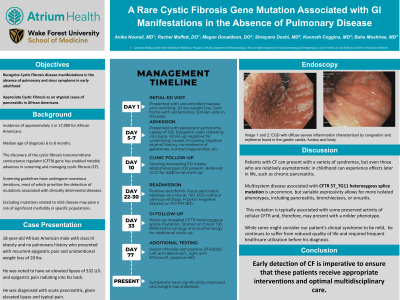Monday Poster Session
Category: Biliary/Pancreas
P1903 - A Rare Cystic Fibrosis Gene Mutation Associated With GI Manifestations in the Absence of Pulmonary Disease
Monday, October 28, 2024
10:30 AM - 4:00 PM ET
Location: Exhibit Hall E

Has Audio

Anika Noorali, MD
Atrium Health
Charlotte, NC
Presenting Author(s)
Anika Noorali, MD1, Rachel Moffett, DO1, Megan Donaldson, DO2, Shreyans Doshi, MD3, Kenneth Coggins, MD1, Baharak Moshiree, MD4
1Atrium Health, Charlotte, NC; 2Atrium Health, Traverse City, MI; 3Wake Forest University School of Medicine, Charlotte, NC; 4Advocate Health Wake Forest Medical University, Charlotte, NC
Introduction: The discovery of the cystic fibrosis transmembrane conductance regulator (CFTR) gene has enabled notable advances in screening and managing cystic fibrosis (CF). Screening guidelines have undergone numerous iterations, most of which prioritize the detection of mutations associated with clinically detrimental diseases. However, excluding mutations related to mild disease may pose a risk of significant morbidity in specific populations. We present a case of an individual with atypical CF disease manifestations occurring over time who was found to have a rare CFTR mutation in early adulthood.
Case Description/Methods: This is an 18-year-old African American male with class III obesity and no pulmonary history who presented with recurrent epigastric pain and unintentional weight loss of twenty pounds. He was noted to have an elevated lipase of 332 U/L and epigastric pain radiating into his back. He was diagnosed with acute pancreatitis, given elevated lipase and typical pain. Common etiologies, including alcohol use, hypertriglyceridemia, cholelithiasis, and hepatobiliary anomaly were excluded. Esophagogastroduodenoscopy (EGD) was performed due to the persistence of intractable vomiting. He was found to have gastritis but no evidence of H pylori. He was started on a PPI twice daily. Follow-up sweat chloride testing revealed the following: left arm 68mmol/L and right arm 67mmol/L. Genetic testing then demonstrated an uncommon CFTR 5T_TG11 heterozygous splice mutation. Stool studies revealed a depressed fecal elastase at less than 50. He was prescribed pancreatic enzyme repletion with improvement in symptoms.
Discussion: Patients with CF can present with a variety of syndromes, but even those who are relatively asymptomatic in childhood can experience effects later in life, such as chronic pancreatitis. Multisystem disease associated with CFTR 5T_TG11 is uncommon, but variable expressivity allows for more isolated phenotypes, including pancreatitis, bronchiectasis, or sinusitis. This mutation is typically associated with some preserved activity of cellular CFTR and, therefore, may present with a milder phenotype. While some might consider our patient's clinical syndrome to be mild, given the absence of pulmonary disease, he continues to suffer from reduced quality of life and required frequent healthcare utilization before his diagnosis. Early detection of CF is imperative to ensure that these patients receive appropriate interventions and optimal multidisciplinary care.
Disclosures:
Anika Noorali, MD1, Rachel Moffett, DO1, Megan Donaldson, DO2, Shreyans Doshi, MD3, Kenneth Coggins, MD1, Baharak Moshiree, MD4. P1903 - A Rare Cystic Fibrosis Gene Mutation Associated With GI Manifestations in the Absence of Pulmonary Disease, ACG 2024 Annual Scientific Meeting Abstracts. Philadelphia, PA: American College of Gastroenterology.
1Atrium Health, Charlotte, NC; 2Atrium Health, Traverse City, MI; 3Wake Forest University School of Medicine, Charlotte, NC; 4Advocate Health Wake Forest Medical University, Charlotte, NC
Introduction: The discovery of the cystic fibrosis transmembrane conductance regulator (CFTR) gene has enabled notable advances in screening and managing cystic fibrosis (CF). Screening guidelines have undergone numerous iterations, most of which prioritize the detection of mutations associated with clinically detrimental diseases. However, excluding mutations related to mild disease may pose a risk of significant morbidity in specific populations. We present a case of an individual with atypical CF disease manifestations occurring over time who was found to have a rare CFTR mutation in early adulthood.
Case Description/Methods: This is an 18-year-old African American male with class III obesity and no pulmonary history who presented with recurrent epigastric pain and unintentional weight loss of twenty pounds. He was noted to have an elevated lipase of 332 U/L and epigastric pain radiating into his back. He was diagnosed with acute pancreatitis, given elevated lipase and typical pain. Common etiologies, including alcohol use, hypertriglyceridemia, cholelithiasis, and hepatobiliary anomaly were excluded. Esophagogastroduodenoscopy (EGD) was performed due to the persistence of intractable vomiting. He was found to have gastritis but no evidence of H pylori. He was started on a PPI twice daily. Follow-up sweat chloride testing revealed the following: left arm 68mmol/L and right arm 67mmol/L. Genetic testing then demonstrated an uncommon CFTR 5T_TG11 heterozygous splice mutation. Stool studies revealed a depressed fecal elastase at less than 50. He was prescribed pancreatic enzyme repletion with improvement in symptoms.
Discussion: Patients with CF can present with a variety of syndromes, but even those who are relatively asymptomatic in childhood can experience effects later in life, such as chronic pancreatitis. Multisystem disease associated with CFTR 5T_TG11 is uncommon, but variable expressivity allows for more isolated phenotypes, including pancreatitis, bronchiectasis, or sinusitis. This mutation is typically associated with some preserved activity of cellular CFTR and, therefore, may present with a milder phenotype. While some might consider our patient's clinical syndrome to be mild, given the absence of pulmonary disease, he continues to suffer from reduced quality of life and required frequent healthcare utilization before his diagnosis. Early detection of CF is imperative to ensure that these patients receive appropriate interventions and optimal multidisciplinary care.
Disclosures:
Anika Noorali indicated no relevant financial relationships.
Rachel Moffett indicated no relevant financial relationships.
Megan Donaldson indicated no relevant financial relationships.
Shreyans Doshi indicated no relevant financial relationships.
Kenneth Coggins indicated no relevant financial relationships.
Baharak Moshiree: AbbVie – Advisory Committee/Board Member. Allergan – Advisory Committee/Board Member. Alnylam Pharmaceuticals – Advisory Committee/Board Member. Ardelyx – Advisory Committee/Board Member. Atmo Biosciences – Advisory Committee/Board Member, Grant/Research Support. Biora Therapeutics (formerly Progenity) – Advisory Committee/Board Member. CinDome Pharma – Grant/Research Support. CinPhloro Pharma – Grant/Research Support. Restalsis Health – Grant/Research Support. Salix Pharmaceuticals of Bausch Health – Grant/Research Support. Takeda Pharmaceuticals – Grant/Research Support.
Anika Noorali, MD1, Rachel Moffett, DO1, Megan Donaldson, DO2, Shreyans Doshi, MD3, Kenneth Coggins, MD1, Baharak Moshiree, MD4. P1903 - A Rare Cystic Fibrosis Gene Mutation Associated With GI Manifestations in the Absence of Pulmonary Disease, ACG 2024 Annual Scientific Meeting Abstracts. Philadelphia, PA: American College of Gastroenterology.
